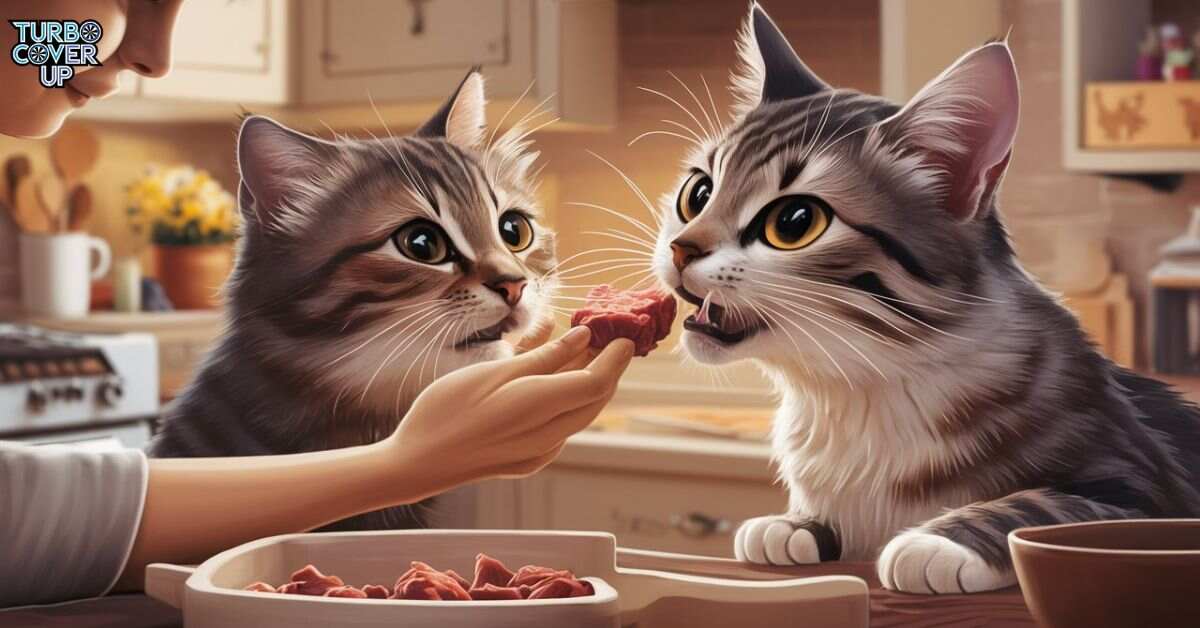Many cat owners wonder if it’s okay to give their pets ground beef. It can be tempting to share this common food with your furry friend, but there are important things to consider. Understanding how to safely incorporate ground beef into your cat’s diet is key to keeping them healthy and happy.
Ground beef can be a tasty and protein-rich treat for cats, but it must be prepared properly. Cooking the beef and serving it in small amounts ensures your cat gets the benefits without any risks. Let’s discuss how to safely feed ground beef to your cat and what you need to know to avoid potential health issues.
A Healthy Diet for Cats
A healthy diet for cats is crucial for their overall well-being. Cats are obligate carnivores, meaning they need a diet rich in animal protein to thrive. This high-protein diet helps meet their nutritional requirements and supports their cat’s health. Commercial cat foods are designed to provide the essential nutrients, including vitamins and minerals, needed for a balanced diet. These foods are formulated to meet the specific cat’s nutritional needs and often include protein sources like chicken, fish, and beef.
While commercial cat foods offer a well-rounded diet, some cat owners prefer to add cooked beef or other animal products to their cat’s meals. However, it’s important to ensure that any additional food complements their balanced diet rather than replacing it. Properly cooked beef can be a good source of essential nutrients when given in moderation. Always consult your veterinarian before making significant changes to your cat’s diet to ensure their nutritional needs are met.
Can Cats Eat Beef?
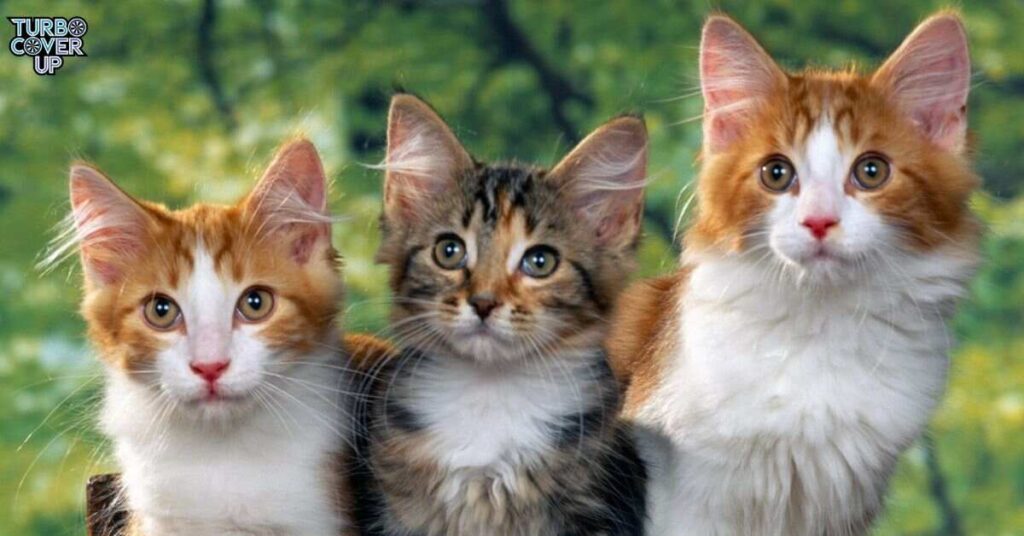
Beef can be a good source of high protein, which is crucial for a cat’s diet. However, how you prepare and feed it is key. Raw beef carries risks of bacterial contamination and parasites, which can be harmful to your cat. Therefore, cooked beef is a safer option and should be offered in small amounts.
When introducing beef snacks to your cat’s diet, ensure it’s cooked thoroughly without any added seasonings, sauces, or spices. These can be harmful to cats. For best results, start with a small portion to monitor for any adverse reactions. If your cat shows signs of allergies or digestive issues, discontinue feeding beef and consult your veterinarian.
Beef Health Benefits
Feeding your cat beef can offer several health benefits. Beef is packed with protein, which supports your cat’s muscle growth and overall cat nutrition. It also provides essential vitamins and minerals that contribute to a healthy coat and skin. Animal protein in beef helps in maintaining energy levels and supporting overall vitality.
In addition to protein, beef contains important nutrients like iron and zinc. These elements play a role in various bodily functions, including maintaining a healthy immune system and supporting cellular functions. Including beef in your cat’s diet can contribute positively to their health when done appropriately and in moderation.
How to Feed Beef to Cats
When feeding beef to your cat, preparation is essential. Always opt for cooked beef rather than raw beef. Cooking helps eliminate harmful bacteria and parasites that can pose health risks. Cut the beef into small, manageable pieces to avoid choking hazards and make it easier for your cat to eat.
Start by introducing beef slowly into your cat’s diet. Mix a small amount with their regular food to gauge their reaction. Keep an eye out for any signs of food allergies or digestive upset. If everything goes well, you can gradually increase the amount. Remember, beef should be an occasional treat and not a staple in their diet.
Top 5 Foods to Avoid Giving Cats
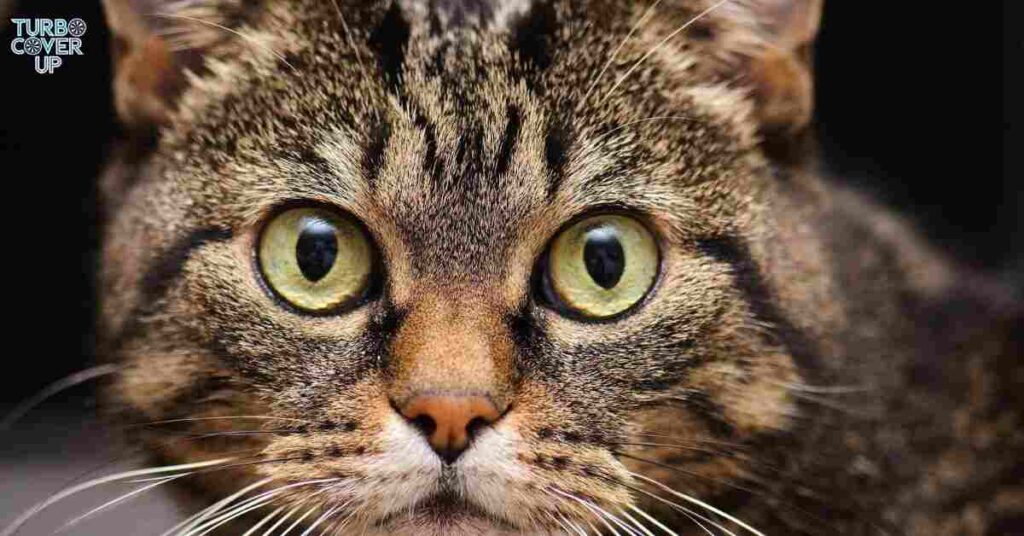
While beef can be a good addition to a cat’s diet, some foods should be strictly avoided. Understanding these can help you keep your cat safe and healthy.
1. Raw Meat
Feeding raw meat poses several risks. It can carry bacteria like Salmonella or E. coli, which are harmful to both pets and humans. Additionally, raw beef and other raw meat may contain parasites that can infect your cat.
2. Alliums
Foods like onions, garlic, and chives, collectively known as alliums, are toxic to cats. They can cause gastrointestinal upset, lethargy, and even damage to red blood cells.
3. Chocolate
Chocolate is highly toxic to cats. It contains theobromine and caffeine, which can cause vomiting, diarrhea, and severe health issues. Always keep chocolate out of reach of your pets.
4. Raw Dough
Raw dough can be dangerous due to the yeast it contains. When ingested, it can expand in the stomach, causing severe discomfort and even life-threatening bloating.
5. Grapes and Raisins
Grapes and raisins can cause kidney failure in cats. Even small amounts can lead to serious health issues, so it’s best to avoid them entirely.
A Note on Bones
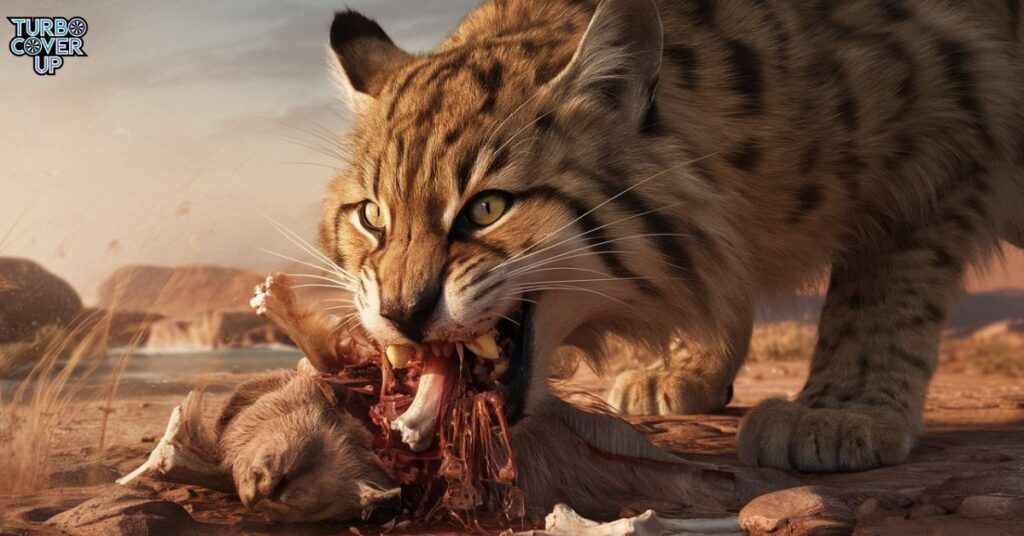
Bones can be dangerous for cats if not handled properly. They can splinter and cause choking or blockages in the digestive tract, which might lead to serious health issues. If you want to give bones to your cat, make sure they are large, cooked, and monitored closely to prevent any accidents.
Cooked bones are generally safer than raw ones because they are less likely to splinter. However, it’s always best to consult your veterinarian before adding bones to your cat’s diet. They can offer advice on safe practices and alternatives that will keep your cat happy and healthy.
Can Cats Eat Pork?
Cats can eat pork, but it must be cooked thoroughly to ensure safety. Raw pork can contain harmful parasites and bacteria that could make your cat sick. Always serve pork in small amounts and make sure it’s free from seasoning or additives.
Even cooked pork should only be an occasional treat due to its high-fat content. Too much fat can lead to digestive issues and weight gain. As always, consult your veterinarian to ensure pork is a safe addition to your cat’s diet.
Can Cats Eat Bacon
Cats can eat bacon, but it’s not ideal for them. Bacon is high in fat and salt, which can lead to digestive issues or long-term health problems like obesity. It’s best to offer bacon only in tiny, occasional amounts.
Too much bacon can cause stomach upset, so stick to your cat’s regular diet of nutritionally balanced food. If you want to give your cat a special treat, consider something specifically made for feline nutrition. Always consult a vet before introducing new foods
Can Cats Eat Sausage
Cats can eat sausage in very small amounts, but it’s not recommended as a regular treat. Sausages are often high in fat, salt, and spices, which can be harmful to your cat’s digestive system. Some ingredients like garlic and onion found in sausages are toxic to cats.
If you want to offer your cat a little sausage, make sure it’s plain, cooked, and free of harmful seasonings. However, sticking to food designed for cats is the safest way to keep them healthy and happy.
Can Cats Eat Beef
To summarize, beef can be a nutritious addition to your cat’s diet when prepared correctly. Ensure it is cooked beef and free from harmful additives. Monitor your cat for any adverse reactions and consult your veterinarian if you have any concerns.
Can Cats Eat Raw Beef
Raw beef is not recommended due to the risks of bacterial contamination and parasites. Always cook the beef thoroughly before feeding it to your cat to ensure safety.
Can Cats Eat Ground Beef
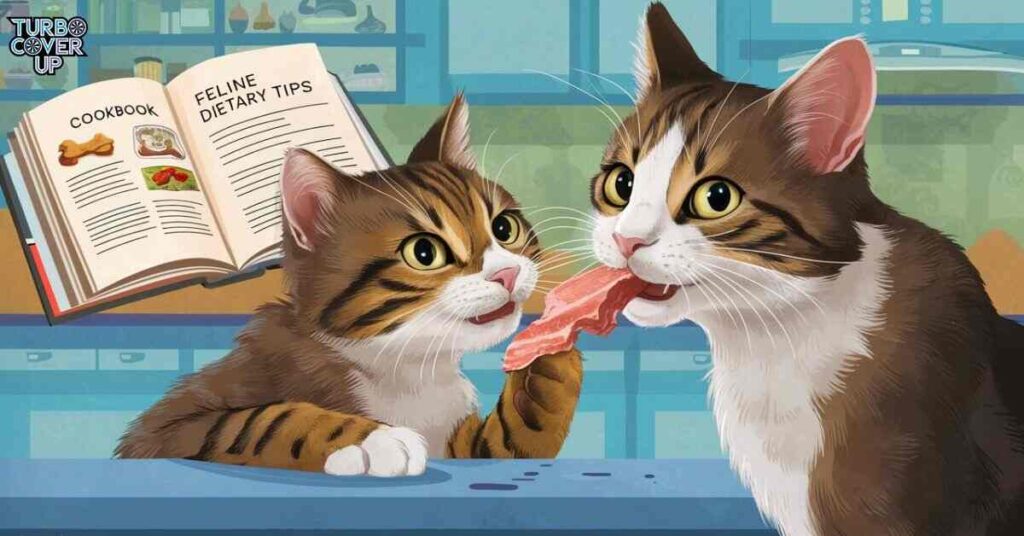
Ground beef can be a part of your cat’s diet if cooked properly. Avoid seasoning and ensure it is well-cooked to minimize health risks. Introduce it gradually and watch for any signs of discomfort or allergies.
Can Cats Eat Steak
Steak can be fed to cats if it is cooked without any seasonings. It’s a good source of high protein, but like all meats, should be given in moderation and prepared safely.
Can Cats Eat Hamburger
Hamburger meat can be suitable for cats if cooked and free from additives. Ensure it is lean and prepared properly to avoid excessive fat intake.
Can Cats Eat Roast Beef
Roast beef can be a nutritious option if prepared correctly. Remove any seasoning and ensure it is fully cooked to avoid any health risks.
Can Cats Eat Beef Jerky
Beef jerky is generally not recommended for cats due to its high salt content and preservatives. It’s better to stick with fresh, cooked beef as a treat.
Can Cats Eat Chicken
Chicken is a common and safe protein source for cats. It should be cooked and free from bones, and it can be a healthy part of their diet.
Can Cats Have Chicken Broth
Chicken broth can be beneficial if homemade and free from additives like salt or onions. It can be a good way to add moisture to your cat’s diet.
Can Cats Eat Fried Chicken
Fried chicken is not suitable for cats due to the added oil and seasoning. It’s best to offer plain, cooked chicken without any breading.
Can Cats Eat Chicken Nuggets
Chicken nuggets often contain breading and seasonings that are not suitable for cats. Stick with plain, cooked chicken to avoid any potential issues.
Can Cats Eat Lamb
Lamb is a good source of protein for cats and can be included in their diet. Ensure it is cooked properly and free from additives.
Can Cats Eat Turkey
Turkey is another protein source that can be included in a cat’s diet. It should be cooked and free from any seasonings or bones.
Can Cats Eat Duck
Duck provides a rich protein source and can be beneficial for cats. Cook it thoroughly and ensure it is free from any added ingredients.
Are Ground Beef Safe for My Cat?
Ground beef can be safe for cats when cooked and given in moderation. Ensure it complements their balanced diet and is free from harmful additives. Always monitor your cat’s health and seek professional advice to ensure
Frequently Asked Questions
Can I feed cats cooked ground beef?
Yes, you can feed cats cooked ground beef as a treat, but make sure it’s plain with no spices or seasonings.
How do I prepare ground beef for my cat?
Boil or cook the ground beef without adding salt, spices, or oil, and let it cool before serving.
Why can’t cats eat beef?
Cats can eat beef, but some may have allergies, so monitor for reactions like itching or stomach issues.
What meat should cats not eat?
Cats should avoid raw meat, processed meats, and anything seasoned with garlic or onion.
Can ground beef replace cat food?
No, ground beef lacks the complete nutrients needed for a balanced feline diet. Stick to commercial cat food for daily meals.
A Final Thought
Feeding your cat ground beef or any other meat should be done with care. Always ensure the meat is properly cooked and served in moderation. Pay attention to how your cat reacts and consult your veterinarian if you have any doubts. Proper feeding practices can help maintain your cat’s health and well-being.
Want to read more?

